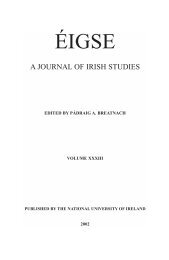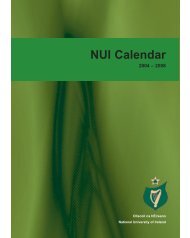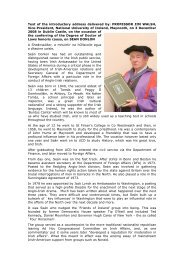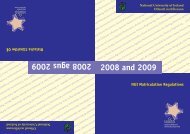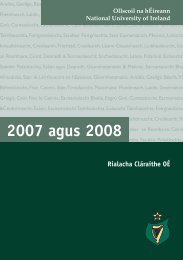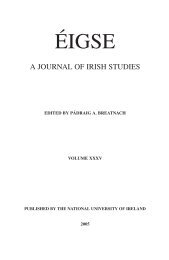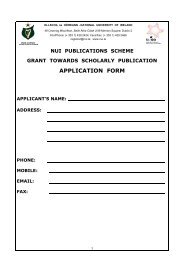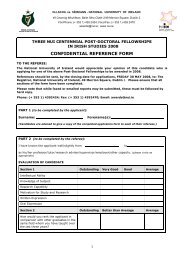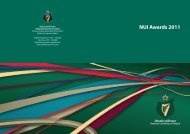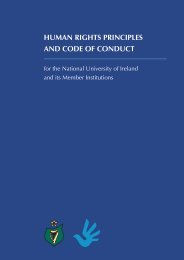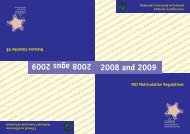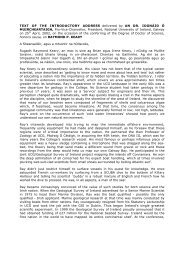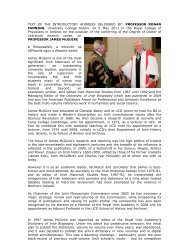Eigse Paged 2004 - National University of Ireland
Eigse Paged 2004 - National University of Ireland
Eigse Paged 2004 - National University of Ireland
Create successful ePaper yourself
Turn your PDF publications into a flip-book with our unique Google optimized e-Paper software.
SETTLEMENT IN MEDIEVAL IRELAND 31<br />
to push it back as far as the ninth century. The earliest precisely dateable<br />
occurrence is found in the Annals <strong>of</strong> Ulster for the year 1011.<br />
According to this entry, Flaithbertach Úa Néill attacked Dún<br />
Echdach, now Duneight in Co. Down, burnt the fort (dún) and<br />
destroyed its baile. 32 As Flanagan notes, baile here appears to represent<br />
some kind <strong>of</strong> settlement, and indeed the verb brissid ‘breaks’<br />
can hardly be used in relation to a unit <strong>of</strong> land. 33 However, the<br />
remaining examples cited by Flanagan cannot be safely dated any<br />
earlier than this. In the glossary attributed to Cormac mac Cuilennáin<br />
(d. 908), baile glosses ráth. 34 However, this particular gloss occurs in<br />
a block <strong>of</strong> entries which is found only in the longer versions and<br />
appears to be later than the original. 35 Indeed, the term ráth would<br />
hardly have required any explanation even in the twelfth century<br />
when it frequently appears in the literature with reference to ancient<br />
settlements, so the gloss can scarcely be any earlier than the thirteenth<br />
or fourteenth century. 36 Flanagan also cites an instance from<br />
the poem beginning A Marbáin, a díthrubaig. 37 Murphy dates the<br />
poem to the ninth century, although previous editors had placed it in<br />
32<br />
The Annals <strong>of</strong> Ulster I (to 1131 AD), ed. Seán Mac Airt and Gearóid Mac<br />
Niocaill (Dublin 1983) s.a. 1011. 6.<br />
33<br />
Flanagan, ‘Common elements: baile’ 9. Mac Airt’s translation <strong>of</strong> baile in this<br />
instance as ‘town’ almost certainly misrepresents the size and nature <strong>of</strong> the settlement<br />
that is likely to have stood here. Buchanan draws attention to traces <strong>of</strong> a nearby<br />
unenclosed settlement which he tentatively equates with the baile mentioned in the<br />
Annals <strong>of</strong> Ulster (R. H. Buchanan, ‘Rural settlement in <strong>Ireland</strong>’ in Irish geographical<br />
studies in honour <strong>of</strong> E. Estyn Evans, ed. Nicholas Stephens (Belfast 1970) 146-<br />
61 (at p. 149). Doherty (‘Vikings’ 327), building on a suggestion by T. E. McNeill,<br />
Castles in <strong>Ireland</strong>: feudal power in a Gaelic world (London 1997) 10, that the motte<br />
and bailey at Duneight may be somewhat earlier than the Anglo-Norman period, has<br />
recently suggested that baile could here be translated ‘bailey’. There is no other evidence<br />
for the specific application <strong>of</strong> baile to such a structure, but it could have been<br />
used <strong>of</strong> a bailey in the broader sense <strong>of</strong> ‘settlement’.<br />
34<br />
Kuno Meyer, Sanas Cormaic: an Old-Irish glossary, in Anecdota from Irish<br />
manuscripts V (1913) 99 §1117.<br />
35<br />
See Paul Russell, ‘The sounds <strong>of</strong> silence: the growth <strong>of</strong> Cormac’s Glossary’<br />
CMCS 15 (Summer 1988) 1-30.<br />
36<br />
Gregory Toner, ‘Settlement and settlement terms in medieval <strong>Ireland</strong>: ráth and<br />
lios’ Ainm 8 (1998-2000) 1-40 (at pp 4-6).<br />
37<br />
Edited by Kuno Meyer in ZCP 3 (1901) 455-457; idem, King and hermit: a colloquy<br />
between King Guaire <strong>of</strong> Aidne and his brother Marban (London 1901);<br />
Kenneth Jackson, Studies in early Celtic nature poetry (Cambridge 1935); Gerard<br />
Murphy, Early Irish lyrics (Oxford 1956) 10-18; James Carney, Medieval Irish lyrics<br />
(Dublin 1967) 66-72: Ruth Lehmann, ‘Guaire and Marban’ ZCP 36 (1978) 96-111.



